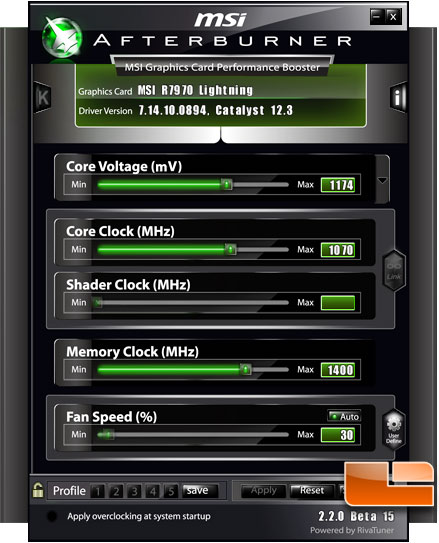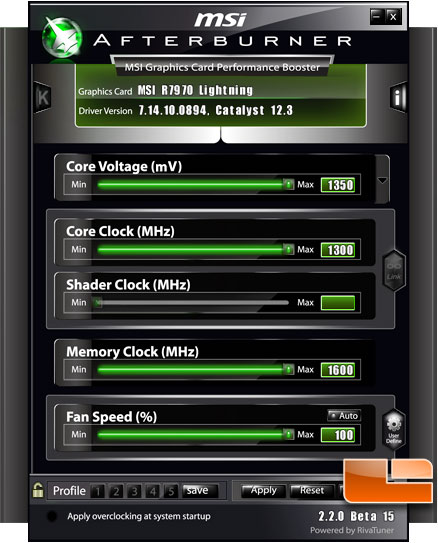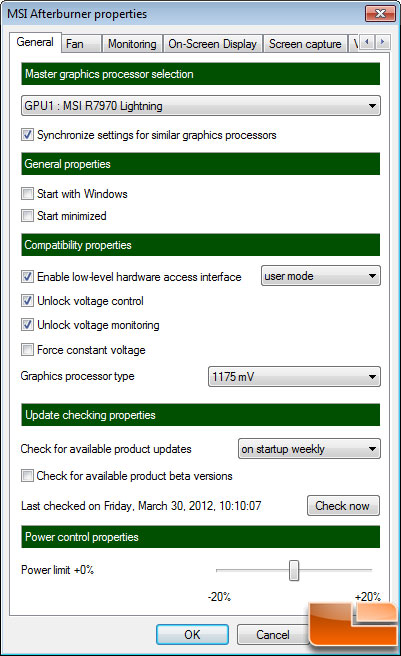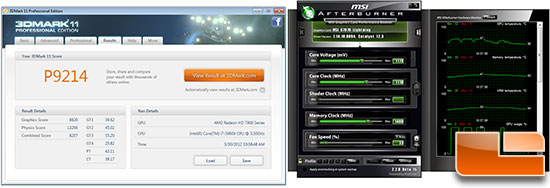MSI R7970 Lightning Radeon HD 7970 3GB Video Card Review
Overclocking The R7970 Lighting
MSI recently released Afterburner 2.2 beta 15 and we tried it out on
the MSI R7970 Lighting in order to overclock it. The MSI Afterburner software that is very easy to use and is a robust utility to overclock video cards.

The AMD Radeon HD 7970 reference card comes clocked at 925MHz on the core and 1375MHz on the GDDR5 memory. MSI already overclocked the R7970 Lighting up yo 1070 MHz on the core and 1400 MHz on the memory (5600 MHz effective). This is an impressive 145MHz or 15.7% clock increase on the core and a mild 25 MHz or 1.8% on the memory.

The Afterburner utility will allow you to go up to 1300MHz on the core and 1600MHz on the memory clocks. It also allows you to adjust the voltage up from the default setting of 1174mV up to 1300mV and to run the fan at 100% if you wish to have it running that fast. If you want to go higher than these limits you can get around them if
you are comfortable making some changes in the Afterburner files that
will increase overclocking headroom. The
steps needed to unlock higher overclocking options are as follows:
To enable the unofficial overclocking in this version it is necessary
to edit the MSIAfterburner.cfg file located in the installation
directory of AfterBurner (typically Program Files (x86) MSI Afterburner).
You need to alter the following:
- Seek UnofficialOverclockingEULA field and add following text:
I confirm that I am aware of unofficial overclocking limitations and
fully understand that MSI will not provide me any support on it - Set UnofficialOverclockingMode to 1 to keep PowerPlay active (may
not work on old ASICs), 2 to traditionally disable PowerPlay or to 0 to
temporary disable unofficial overclocking path
Once this is done you’ll be able to further overclock the video card, but let’s see if we need to do that on this card.
We started out overclocking the core clock on the MSI R7970 Lighting to see how far we could go and we hit a brick wall at 1110MHz on the core. This was enough to improve our 3DMark11 score from P8898 to P9214, but is a pretty disappointing overclock to be honest. With the fan left on auto we hit a peak temperature of 57C on our 3DMark11 performance run.

We knew this card was designed for overclocking, so we didn’t give up and went into the settings of the Afterburner application to see what we could do. Under the general properties tab we noticed that the power control properties had the power limit set to 0%. We increased this to +20% and tried overclocking the card again.
With the power limited increased to +20% we were able to hit 1175MHz on the core clock and our 3DMark11 score shot up to P9585! This is a great overclock and the highest that we could get the AMD Radeon HD 7970 reference card to run was 1160MHz, so we are beyond that now. With the fan left on auto we hit a peak temperature of 58C on our 3DMark11 performance run. This card was unstable at 1180MHz and beyond, but remember we haven’t touched the GPU Voltage yet!
The highest overclock that we could get out of the MSI R7970 Lighting with air cooling
was 1275 MHz on the core and 1500 MHz on the memory. To get this we had to bump up the voltage from 1175mV to 1275mV and while this greatly improved our overclock the temperature shot up to 69C with the fans left on auto. With these aggressive clocks we were able to get a 3DMark11 score of P10266! This is solid score and it should be noted that we could get 1300 MHz core clock on this card to run, but it had artifacts. We don’t consider that a stable overclock, so we won’t bother showing you anything on that, but some lucky people might be able to reach that with air cooling.
On 3DMark 11 we saw our score go from P8898 to P10266, which is a 15.4% or 1368 3DMark point increase from the cards factory settings. Our 205
MHz core clock increase was a 19% increase, so we are happy to
see a solid 15% performance increase in this synthetic benchmark. A AMD Radeon HD 7970 reference card scores P8069 on our test system, so we running this card 27% faster than originally designed!




Comments are closed.